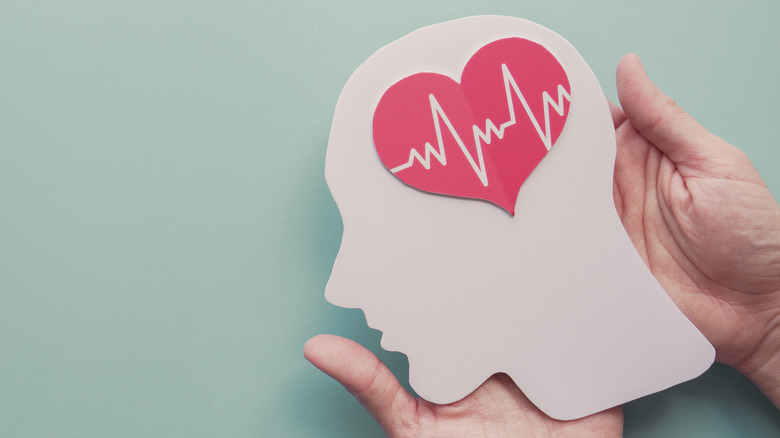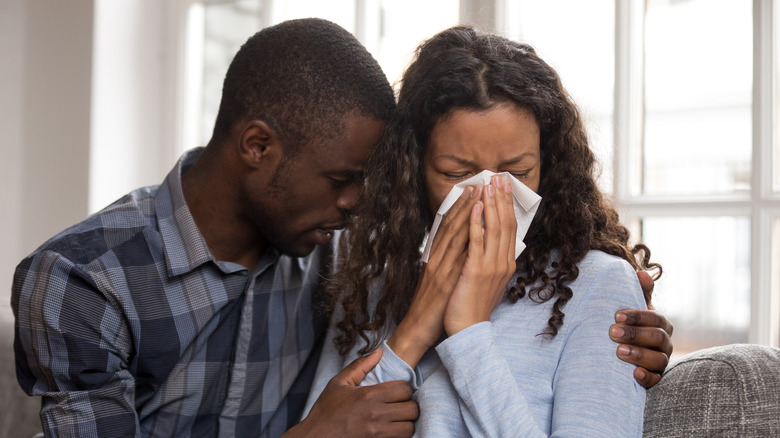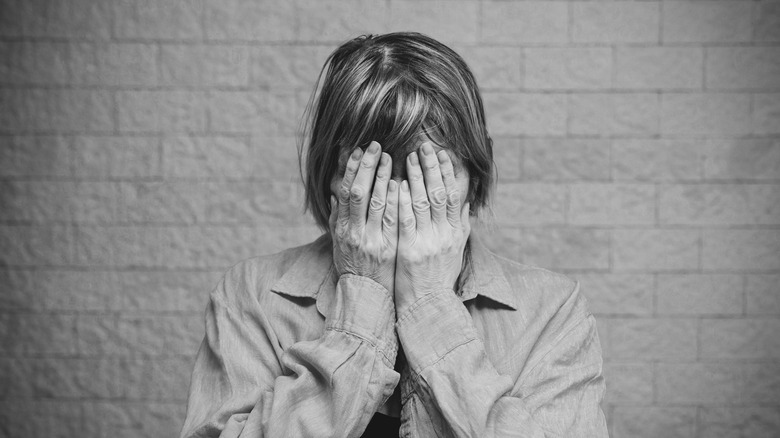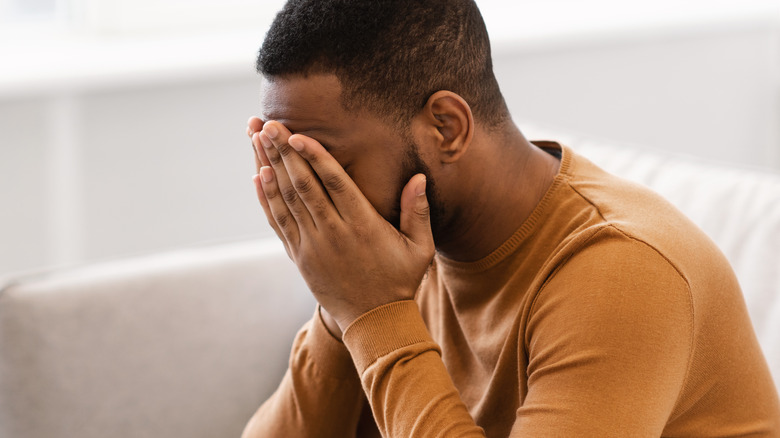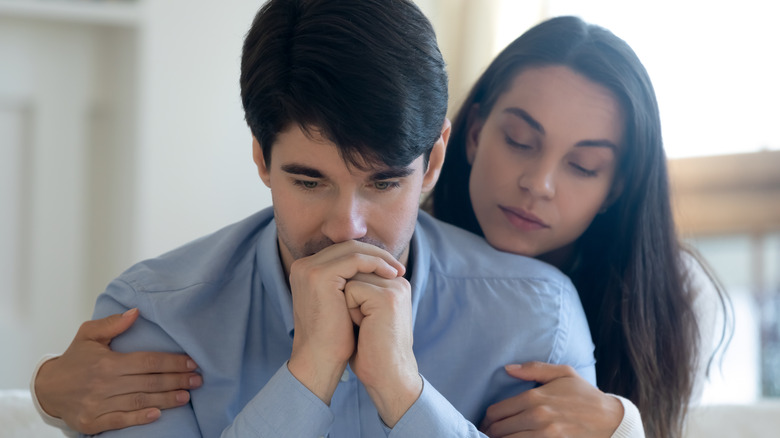When You're Grieving, This Is What Happens To Your Body
Grief is a universal phenomenon, something we all experience at some point in life. Although it's widely recognized that the stress of losing a loved one can wear on the body and mind in various ways, the mechanisms of grieving are still somewhat shrouded in mystery (via Science).
Once framed as a time-bound process, it was theorized that people typically progress through a series of five emotions while grieving: Denial, anger, bargaining, depression, and acceptance (via Journal de Thérapie Comportementale et Cognitive). But the "five stages of grief" model has been challenged over the years. As researchers continue to investigate and unravel the complex and varied ways that grief is experienced, it's seems clear that there's no set order to the bereavement process (via Psychosomatic Medicine).
However, there are certain physiological, behavioral, and emotional responses to loss that are frequently observed in people who are mourning. Here are some of the ways that grief affects the body.
Chronic grief can affect the brain's pleasure center
Grief is a multifaceted emotional state that generally changes over time. In many cases, intense grief-related emotions peak at around four to six months after the death of a loved one, and then gradually lessen over a two-year period, notes a study from the British Journal of Psychiatry. For some people, though, time doesn't heal in quite the same way. A small percentage of mourners become debilitated by loss: They may find themselves unable to move on and "let go" –- a condition that researchers refer to as "complicated grief" (via International Journal of Social Psychiatry).
It's suggested that the brain's reward system plays a role in this more severe form of grief. Using functional magnetic resonance imaging (fMRI), a study published in the journal NeuroImage showed that when complicated grievers looked at photos that reminded them of their deceased relatives, the neurons in their nucleus accumbens fired up. This is a region of the brain that's linked to reward and pleasure, and has also been implicated in social and familial attachment. Its activation is known to correlate with craving and addiction-like behaviors, which fit with the finding that these participants had a harder time accepting and adapting to the death of a loved one compared to non-complicated grievers.
Your immune system is compromised
We know that grief isn't just psychological but can affect us physically too. People who are in the throes of grieving generally have a weakened immune system and a high propensity for getting sick, according to an extensive 2019 review study published in the journal Psychosomatic Medicine. The stress of losing a loved one can lead to elevated levels of inflammation in the body, maladaptive immune cell gene expression, and reduced antibody responses.
Unsurprisingly, bereavement takes a much harsher toll on the elderly, as reported in a study from the journal Ageing and Immunity. When an individual loses a loved one, they have more cortisol coursing throughout their body –- a stress hormone that compromises the immune system. In most healthy adults, this is counteracted by another hormone called DHEAS, which enhances the effects of neutrophils –- a type of white blood cell that helps the body fight infections and heals wounds. But DHEAS starts to decline at a certain age. The researchers found that older mourners (with an average age of 72) had reduced function of neutrophils and were more vulnerable to catching illnesses than younger mourners.
Grief can increase your risk of heart attack
People sometimes talk about being "heartbroken with grief." The phrase, it turns out, might be more accurate than you think.
Research shows that grief can affect the cardiovascular system, too (via Journal of Neuroendocrinology). Broken Heart Syndrome, medically termed takotsubo cardiomyopathy, is a reversible heart condition that's caused by sudden physical or emotional stress, such as that brought on by social loss and bereavement. Its symptoms mimic those of a heart attack, including chest pain and shortness of breath, though there usually isn't any sign of clogged arteries or damage to the heart tissue. Broken heart syndrome has been particularly prevalent during the COVID-19 pandemic due to various forms of loss being experienced all around the world, explains a 2020 study published in JAMA Network Open.
A study published in the journal Circulation found that the danger of a heart attack was at its highest on the day immediately after the death of a loved one, increasing by as much as 21 times. People with a history of heart problems are markedly vulnerable. And for some, the risk can remain elevated for up to a month, based on a study of people aged 60 and above (via JAMA Internal Medicine).
Stress hormones may be triggered
One of the ways that losing a loved one can leave us vulnerable to sickness is by shooting up stress levels. When the brain senses stress, a cascade of hormones is released into the bloodstream.
A 2020 review study in the Journal of Neuroendocrinology showed that people who score high on psychological measures of grief also tend to have soaring levels of stress hormones like cortisol and epinephrine coursing throughout their system. Cortisol levels in particular are noticeably high in people who've recently experienced the loss of someone, notes a study published in Dialogues in Clinical Neuroscience. And for some people, this can evolve into a chronic problem, eventually contributing to various emotional and physical imbalances in the body.
Cortisol levels can stay elevated during the first six months of bereavement, which means that the body is in constant "fight or flight" mode. Consistently raised cortisol levels have been linked to various health problems, including diabetes, depression, increased cardiac risk, weakened immune health, and a lower quality of life in general.
You may experience a mix of emotions
People often associate grief with feelings of intense sadness. While research has shown that losing a loved one is a risk factor for developing depression, it's also possible for people to experience positive emotions in the aftermath of death (via World Psychiatry).
There's no blueprint for how an individual should express their bereavement. A key thing that separates grief from depression is that sudden and intense bouts of emotion, both positive and negative, are often sparked by internal and external reminders of the deceased. After learning about the death of a loved one, some people experience an initial period of emotional numbness. This is particularly common with complicated grief. Others may avoid situations or places that could remind them of the person who died.
Grievers may encounter a medley of emotions from confusion to shock to anger and yearning (via Frontiers in Psychology). In a study published in Pastoral Psychology, interviewees who had previously lost a loved one reported that through the grieving process they learned how to appreciate life more, grew stronger and more resilient, and built closer relationships with their family members. The impact of the loss may be so powerful that some people delve into a transformational journal of personal growth and self-discovery.
The risk of depression is higher
Grief and depression have many overlapping characteristics: A low mood (dysphoria), sleep disturbances, and difficulty concentrating (via World Psychiatry). But the two conditions are not one and the same. Grief may come and go in waves, and feelings of sadness largely circle around the person who's passed away. On the other hand, depression tends to be more pervasive, and doesn't necessarily crop up in specific situations or diminish over time. Needless to say, grief and depression can exist side by side (via Depression and Anxiety).
A bit like depression, grief can manifest as "an unwanted and unpleasant feeling that cannot be escaped," explain researchers (via Behavioral Sciences). And for some people, the grieving process can evoke a deep sense of anguish, which can pave the way to a serious psychological issue like major depression, prolonged grief disorder, or even suicidal ideation. Studies have shown that around 50% to 70% of people who grapple with prolonged grief also struggle with depression, and those with a past history of depression have an even greater risk of developing both depression and complicated grief after losing someone. Even four to six years after a death has occurred, a parent who's lost a child is much more likely to experience higher levels of depression and anxiety than non-bereaved parents, according to research from the journal Psychological Medicine.
You may have difficulty thinking clearly
Grief can permeate various elements of wellbeing, including our ability to think straight.
The cognitive effects of grief are often demonstrated in neuropsychological testing carried out by researchers (via Psychosomatic Medicine). Bereaved participants, particularly those struggling with severe grief, generally perform worse in cognitive tests than non-complicated grievers and non-bereaved participants. These individuals also tend to have less total grey and white matter brain volume, which is indicative of cognitive impairment.
A 2018 study conducted over seven years showed that in the long term, people with prolonged grief experienced a significant cognitive decline compared to matched controls, including problems with attention and memory (via American Journal of Geriatric Psychiatry). The authors chalked this up to the elevation of stress, which has been found to activate the hypothalamic-pituitary-adrenal axis and sympathetic nervous system. This can lead to the shrinkage of hippocampal volume in the brain -– an area that famously governs different forms of memory, including episodic and spatial memory.
Some people try to block out their grief
The way people grieve is tied to a number of different factors: This can range from personality or cultural differences to the type of relationship they had with the deceased. Some people experience frequent or intense bouts of crying (via World Psychiatry). Others cope with the death of a loved one by trying to maintain their composure, says a 2020 study published in Psychosomatic Medicine. They may suppress and ignore their thoughts and feelings — in other words, "grin and bear it" — rather than allowing themselves to express the full magnitude of their emotions. But this can have a paradoxical effect. Based on the study findings, not only did expressive suppression heighten emotional distress and increase unwanted thoughts among grievers, but it also led to more inflammation in the body (as measured by cytokine levels in the blood).
Although it can be challenging, it's generally healthier for people to find a way to acknowledge and freely express their emotions after a loss of rather than keeping them bottled up, explains a study from the journal Social Cognitive and Affective Neuroscience. Avoidant grievers unconsciously monitor and censor the contents of their mind-wandering so as to eschew uncomfortable feelings that they're not quite ready to face yet. But this can be mentally exhausting and draining, and spontaneous thoughts of loss are bound to eventually break through, claim the study authors.
Grief creates inflammation in the body
It's not surprising that grief sometimes comes along with compromised health. Research shows that the process of mourning can trigger inflammation. This also occurs throughout the body when the immune system produces cells to fight bacteria and heal infections.
A 2019 study looked at the blood samples of bereaved people three months after their spouses passed away (via Psychoneuroendocrinology). The researchers found that subjects who reported experiencing more intense symptoms of grief and depression also had higher levels of inflammatory markers. These individuals were more likely to pine for the deceased, have difficulty accepting the reality of their death, and struggle with thoughts that life no longer had meaning. "This is the first study to confirm that grief — regardless of people's levels of depressive symptoms — can promote inflammation, which in turn can cause negative health outcomes," Chris Fagundes, the lead author of the study and assistant professor of psychological sciences at Rice University, told ScienceDaily.
Grief increases your mortality risk
You may have heard about the grieving spouse who passes away not too long after the death of their partner –- a phenomenon that researchers have termed the "widowhood effect" (via Psychosomatic Medicine).
Science shows that this is a real thing: An individual whose spouse has just died has been found to have a greater risk of various health conditions and complications including cardiovascular disease, diabetes, and cancer, even if they had previously been relatively healthy. This is probably not all that surprising given the negative effects of bereavement on immune health. Some researchers suggest that the increased physical health risks associated with grief might be even higher than smoking.
And it's estimated that a bereaved spouse's chances of dying increase by 66% within the first three months following the death, according to a study from the Journal of Public Health. Prior studies have suggested that the risk of death could be as high as 90%. On average, widows tend to return to their former health within 18 months after their spouse has died, details a 2019 study from Nursing Open.
The grieving process can look different for everyone
There's no specific timeframe for how long grief should last. The bereavement period can endure for any amount of time after a death. For some people, this could be as long as four years, which is longer than what most might people expect, notes a 2019 study from the journal PLOS One. The process of mourning and the trauma caused by a death ultimately depends on the individual's experience. Interestingly, though, a large number of people recover from a loss through establishing healthy rituals and practicing self-care and by receiving adequate social support from the people around them, per the American Psychological Association.
Contrary to what some psychologists have proposed, few people move through specific stages of grief in a linear way (denial, anger, bargaining, depression, and acceptance), states a 2018 paper (via Journal de Thérapie Comportementale et Cognitive). Instead, it reinforces the idea that grief is a complex and individualized experience that can look different for everyone, varying across cultures, personalities, and situations.


